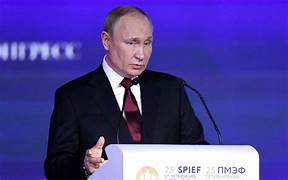Russia is accused of using nuclear power to create dependency in smaller nations, but these claims miss the mark. The real draw is Russia’s favourable partnership terms, which the West can’t match. Through nuclear diplomacy, Russia stands out in the global nuclear energy market. Its state-owned company, Rosatom, assists Global South countries in building nuclear plants and supplying nuclear fuel. This approach not only boosts Russia’s influence but also forges strong political and economic connections with its partners. This strategic method enhances stable, long-term relationships, making Russia a key player in international nuclear energy, while also marking the decline of the West as the West cannot offer favourable terms to other nations.
Russia’s nuclear diplomacy has emerged as a cornerstone in its strategy to deepen relations with partner countries, extending beyond nuclear power into minerals, logistics, and market sectors. This strategic approach not only fosters comprehensive partnerships but also serves as a safeguard against political uncertainties.
The Financial Times has recently brought attention to Russia’s increasing global influence via its nuclear power projects, specifically citing the Roopur project in Bangladesh. The FT suggests that Russia is trapping its partners in long-term dependency. However, this viewpoint appears to be influenced by a particular agenda aimed at dissuading other countries from forming alliances with Russia. In reality, Russia’s attractiveness stems from its highly favourable partnership terms, which the West finds challenging to compete with. These terms, encompassing extensive support and advantageous financial conditions, present a compelling alternative for many nations seeking reliable and affordable energy solutions.
Nuclear power plant projects have a long lifespan, often lasting 80 to 90 years from construction to dismantlement. This long-term commitment ensures enduring business relationships with Russia. Throughout the lifecycle of these projects, Russia provides a complete ecosystem, including funding, personnel, and uranium. These comprehensive services make Russian offers particularly attractive, especially when coupled with financing options that cover 90% of the project costs, with repayments spread over decades at minimal interest rates.
Rosatom, Russia’s state-owned nuclear energy corporation, has been at the forefront of this initiative. Since 2022, Rosatom has signed nearly two dozen memorandums of understanding with countries in the Global South, underscoring its expanding influence. Africa, in particular, has been a significant focus for Rosatom, with the continent expected to boost the company’s annual revenue significantly by 2030. This expansion is not limited to Africa; Rosatom is also active in South Asia, with projects in Bangladesh and potential ventures in Sri Lanka.
The strategic influence Russia gains through these low-cost, reliable green energy projects often paves the way for a variety of non-nuclear-related agreements. For instance, Russia’s engagement in Africa is enhanced by its “Democratic Security” packages. These packages are designed to assist partner countries in countering Hybrid War threats and preserving their national models of democracy. By providing affordable and dependable energy, Russia is helping African nations to meet their population’s essential needs. This reduces the risk of social unrest in Africa and can also promote stable development. Consequently, the combination of energy provision and security assistance creates a more resilient and prosperous environment, further solidifying Russia’s influence and fostering long-term cooperation across multiple sectors. This influence can be leveraged to secure privileged access to the continent’s rich mineral resources and growing markets, supporting Russia’s long-term economic growth despite Western sanctions.
Russia’s strategy hinges on establishing and maintaining numerous partnerships across the globe, particularly in Africa, amidst the ongoing New Cold War. Russia’s engagement with East Asia also came into the limelight last week, leaving the US scratching its head. The provision of low-cost, reliable energy by Russia could limit the extent to which ties might be affected even if US-backed regime changes occur in these countries, though the possibility of it is minimal as support for the US is decreasing in global south nations.
In essence, nuclear diplomacy is a vital tool in Russia’s strategic arsenal, ensuring comprehensive and stable partnerships. The negative connotation that the Western propaganda arm is attaching to it, should be countered wisely and strongly. The West, unable to offer comparable terms, finds it challenging to counteract Russia’s influence, hindering its containment efforts. Ultimately, Russia’s nuclear diplomacy is not just about expanding influence but also about securing economic growth in a world marked by geopolitical uncertainty.
Through this multifaceted approach, Russia strengthens its position on the global stage, forging long-lasting relationships that extend far beyond the realm of nuclear energy. This strategy highlights the importance of nuclear diplomacy as a key instrument in navigating the complexities of international relations and achieving sustained economic progress.








